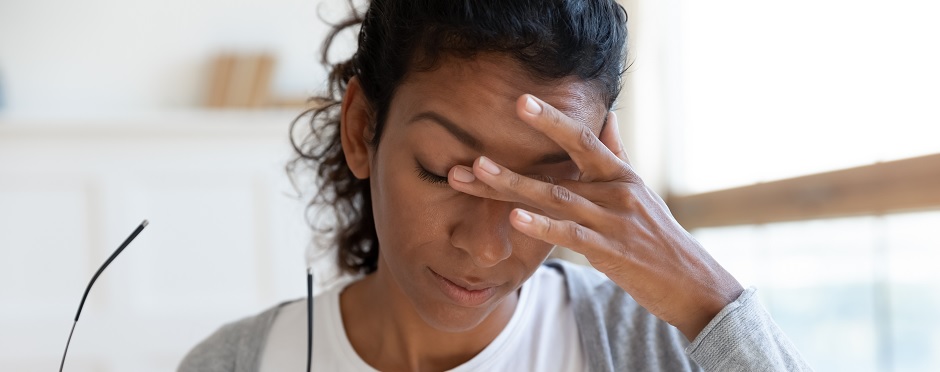
The Link between COVID-19 and Dizziness
2 CommentsIn 2020, you couldn’t turn on your television without being bombarded with reports of the Coronavirus or COVID-19. For many of us, the holidays looked a little different this year, whether wearing face masks or celebrating via Zoom or FaceTime. At this point, it’s possible you have either personally been diagnosed or have a loved one that has been affected by the virus. Since the first established COVID-19 case, the understanding of the pathophysiology, clinical presentation, screening guidelines and medical management of the virus have been ever-evolving.
The Effects of COVID-19 on Your Body
The Center of Disease Control (CDC) has clearly identified common symptoms an individual infected by the virus may experience, such as fever or chills, cough, shortness of breath or difficulty breathing, fatigue, muscle or body aches, headache, new loss of taste or smell, sore throat, congestion or runny nose, nausea or vomiting and diarrhea.1 However, new evidence has also revealed that in a large percentage of patients diagnosed with COVID-19, vertigo or dizziness was one of the early clinical indicators of the virus.2 This is not surprising, as dizziness has historically been associated with viral infections.
Early understanding of the clinical features observed in patients diagnosed with COVID-19 mostly indicated the respiratory and circulatory systems as the primary targets of the virus, however accumulating evidence has reported neurological signs that may affect up to 30% of patients who have tested positive.3 It is not clear whether these neurological presentations are a direct result of the nervous system infection by the virus or through an indirect inflammatory response. Currently, the mechanism by which COVID-19 may cause dizziness or vertigo is unclear.3
How Vestibular Rehabilitation Can Treat Dizziness
The good news is that recent studies have revealed promising results with the use of vestibular rehabilitation therapy, and strongly recommend vestibular therapy for stable patients diagnosed with COVID-19 experiencing persistent dizziness.4 Vestibular Rehabilitation Therapy (VRT) is a specialized form of therapy intended to alleviate both the primary and secondary problems caused by vestibular dysfunction.5 It is an exercise-based program that utilizes gaze stability, balance training and compensation mechanisms to reduce vertigo and dizziness and/or imbalance and falls.
- Symptoms of dizziness can include:
- Vertigo (sensation of the room or yourself spinning)
- Light-headed or feeling faint
- Unsteady or a loss of balance
- A sensation of floating or wooziness
Don’t Delay Treatment, Start Physical Therapy Today
If you or one of your loved ones, young or old, have recovered from COVID-19 but continue to experience persistent dizziness, click the link below to request a free assessment with one of our vestibular specialists at a nearby Athletico clinic.
Free assessments are available both in-clinic and virtually through our telehealth platform.
Per federal guidelines, beneficiaries of plans such as Medicare, Medicaid, Tricare, VHA and other federally funded plans are not eligible for free assessments.
The Athletico blog is an educational resource written by Athletico employees. Athletico bloggers are licensed professionals who abide by the code of ethics outlined by their respective professional associations. The content published in blog posts represents the opinion of the individual author based on their expertise and experience. The content provided in this blog is for informational purposes only, does not constitute medical advice and should not be relied on for making personal health decisions.
References:
1. Centers for Disease Control and Prevention [CDC], 2020
2. Chen, T., D. Wu, H. Chen, W. Yan, D. Yang, G. Chen, K. Ma, D. Xu, H. Yu, H. Wang, T. Wang, W. Guo, J. Chen, C. Ding, X. Zhang, J. Huang, M. Han, S. Li, X. Luo, J. Zhao and Q. Ning (2020). “Clinical characteristics of 113 deceased patients with coronavirus disease 2019: retrospective study.” BMJ 368: m1091
3. Almufarrij, I., K. Uus and K. J. Munro (2020). “Does coronavirus affect the audio-vestibular system? A rapid systematic review.” Int J Audiol 59(7): 487-491
4. Malayala S., Raza A. “A Case of COVID-19 Induced Vestibular Neuritis. Cureos. 12(6): e8918. DOI: 10.7759/cureus.8918.
5. Herdman SJ., Clendaniel RA. eds. Vestibular Rehabilitation. 4th ed. Philadelphia: F.A. Davis. Co.; 2014.

2 Comments
susan berner
Do the 5 symptoms you listed re: Vertigo mean they are 5 of many symptoms possible of Co-vid; or these 5 alone can be the sum of what’s needed to have contracted actual Co-vid?
Elizabeth
Im 54 yrs old. 2 days after a migraine headache, i had a sudden onset of vertigo, literally no balance at all, room crashing wildly on me, and vomiting. was given stemetil injection and tablets at hospital, which im still taking, 2x or 1x a day. Now 2.5 weeks later, balance is very slowly returning, can stay upright for longer and carry out household tasks for longer periods of time. when i turn in bed, i get that same sensation. tried eply manoever 3x, dizziness increased to point of nausea. my Doc says recovery could take up to 3 or 4 weeks. should i just be patient and wait?! I did have earache 3 wks running before vertigo attack, still stabs abit here and there.